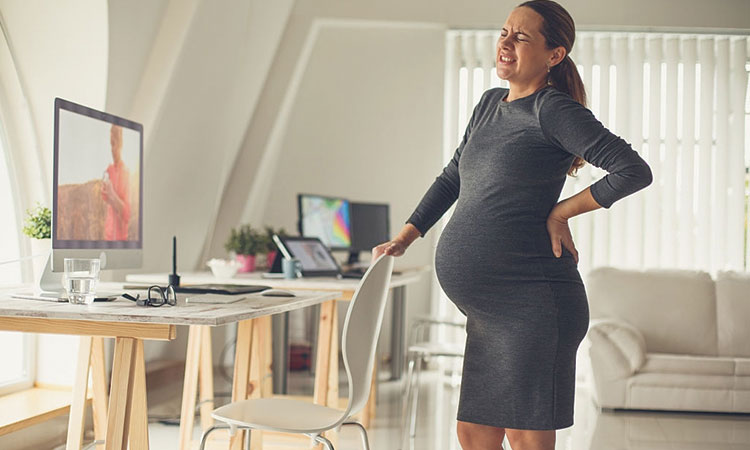Pregnancy is one of the few phases in life that can be both amazing and alarming. Pregnancy is almost always accompanied with pains, aches, and many other discomforts. There are many common pregnancy aches and pains which can make you feel irritable – and they cannot always be avoided. However, some remedies can help you feel less comfortable.
Many expecting women experience whole body aches during pregnancy first trimester. Many experience upper front thigh pain during pregnancy. Although some pain passes away without bothering you, because of its location, some pain can impinge on your daily routine.
The basic instinct is to pop a pill for pregnancy aches and pains but you should know that all pain killers are not safe during pregnancy. This necessitates finding some other remedies to deal with pregnancy pains and aches.
9 Common Pregnancy Aches And Pains With Remedies
A changing body and hormonal changes are the main cause of pains and aches during pregnancy. Hormonal and physiologic changes during pregnancy increase the risk of musculoskeletal problems in pregnancy. Let us know more about the common pain points during pregnancy.
1. Headaches
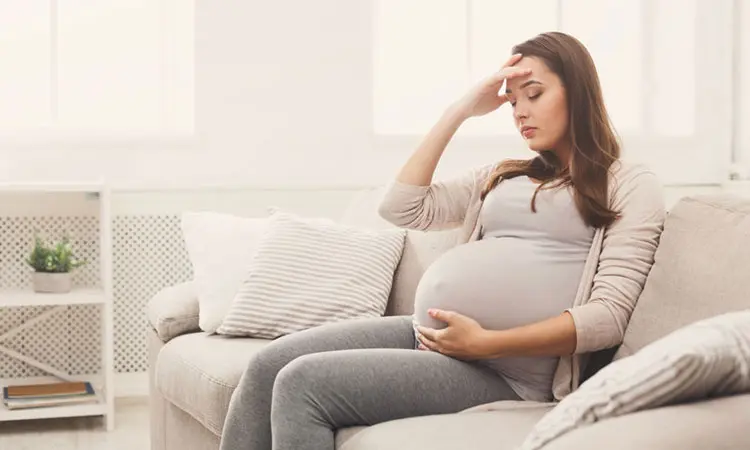
Headaches are one of the most common pains experienced by expecting mothers. It appears any time during pregnancy. However, more often it appears during the first and third trimesters.
Causes
According to NCBI resources, many reasons could trigger headaches during pregnancy.
Our panel gynaecologist Dr Ankita Patel Tayal says that lack of sleep, extreme fatigue, dehydration, low blood sugar, and stress can trigger headaches during pregnancy. Expecting mothers are asked to cut the intake of caffeine because caffeine intake is not safe during pregnancy. Sudden caffeine withdrawal can cause headaches.
You can get a sinus infection during any trimesters of pregnancy. A sinus infection usually comes hand in hand with headaches.
Calculate Due Date With LMP
Headaches during the third trimester can be due to an underlying condition – preeclampsia.
Symptoms
Headaches come in different forms. You might feel dull aches all over the head. It can also appear as throbbing pains in both one of your temples. Sometimes pain appears behind the eyes.
It also can appear as deep pulsing from the depth of the head. You might not be able to look at bright light. You might not be able to tolerate even feeble sounds. When all these three symptoms come together, you might be having a migraine, an intensified form of headache.
Remedies
Stay well hydrated. Dehydration can trigger headaches. Never skip meals. Skipping meals can also trigger headaches. Take all the measures to get a good night’s sleep. Sleep deprivation can cause headaches during pregnancy.
Relaxation techniques like breathing exercises, meditation, and yoga will help to bring down the episodes and severity of headaches. Try to spend time in airy rooms rather than congested ones.
Applying warm compress around eyes and nose will help to relieve headache due to sinus. Applying a cold compress underneath the neck helps to relieve stress headaches.
Most of the pain killers that we use to treat headaches before pregnancy are not safe during pregnancy. Dr Ankita Patel Tayal, MD obgyn, recommends that for mild headaches, you can take the lowest dose of paracetamol.
2. Leg pain
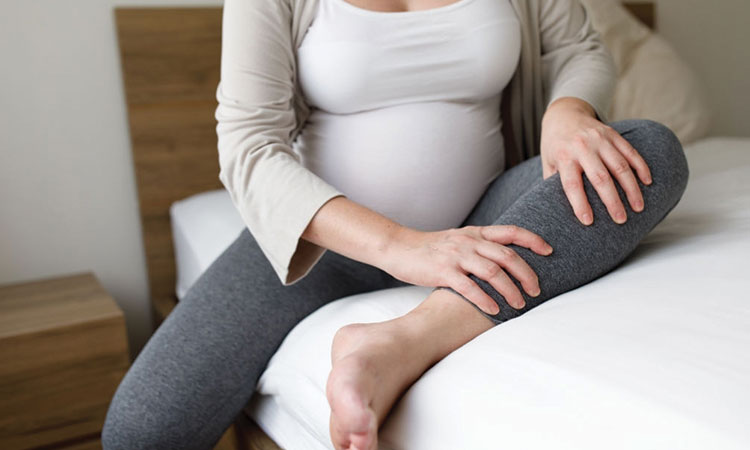
Leg pain is common during the second and third trimester of pregnancy and it more often happens at night.
Causes
Leg cramps happen when the muscles are contracting very tightly when they shouldn’t be. Leg pain can occur as a result of too much phosphorus and too little calcium in the body. Magnesium deficiency can also trigger leg pain. Edema is another reason that causes leg pain.
Limited blood circulation to the lower limbs can also cause leg pain during pregnancy. This happens when the growing uterus puts extra pressure on blood vessels that carries blood towards the legs.
Symptoms
Leg pain or leg cramp appears as a sudden sharp spasm in the calf muscle. It usually lasts for a few minutes.
The pain behind the calves can be extremely severe that could wake the pregnant women from a deep sleep. Leg pain during pregnancy also appears as some strain in the legs.
Remedies
Stay well hydrated. Dehydration can cause leg cramps. Stretching helps to increase blood circulation and relax the calf muscles. Stretch the feet and legs before bed helps to reduce the frequency and severity of leg pain.
To stretch the calf muscles, straighten your legs as much as you can. Now, bend your ankle and toes forward the maximum you can. Now slowly bring it up pointing towards your torso. Stretch it as much as you can. Repeat this 4 to 5 times.
Gently massaging the leg helps to reduce leg pain which happens due to decreased blood circulation. A hot compress helps to improve blood circulation in the legs and relieve leg pain.
Including more calcium in your pregnancy diet also helps to reduce leg pain during pregnancy. Likewise, wear proper footwear during pregnancy. Avoid those that put extra strain on the legs, like wearing heels during pregnancy.
3. Pregnancy rib pain
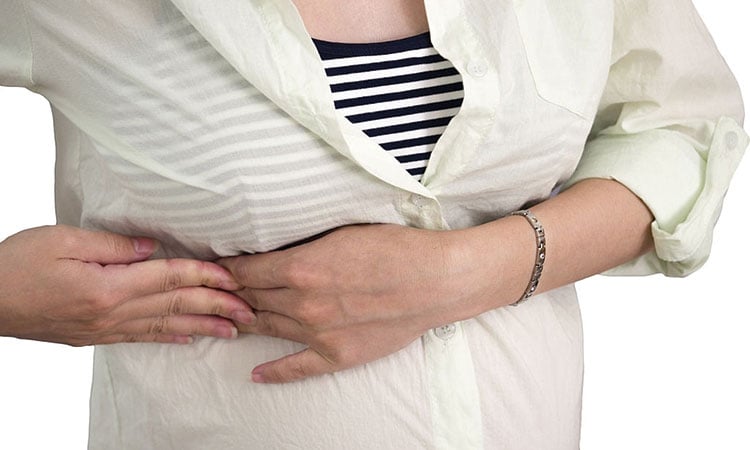
Rib pain during pregnancy usually occurs in the third trimester. However, many mothers experience it towards the end of the second trimester as well. Even though the pain can be excruciating at times, it will not affect the pregnancy and growing baby.
Rib pain during pregnancy will ease as the baby drops towards the last weeks of pregnancy. And it will disappear soon after delivery.
Causes
As the pregnancy progresses, the uterus expands to accommodate the growing baby. Uterus, therefore, starts to push the other internal organs to get more room to expand. At one point, all the organs will be pushed towards the ribs. This can cause rib pain and shortness of breath.
The position and movement of the baby can also apply constant pressure on the ribs causing rib pain. As the baby grows it starts to move around and kick in ribs. The baby also stretches under the ribs. The frequency of rib pain increases as the baby grows and needs more space.
Therefore as the pregnancy progresses the rib pain also worsens. the breech position of the fetus is another factor that puts excessive pressure on the ribcage. Mothers with shorter waist and carrying big babies are more likely to experience rib pain during pregnancy.
The surge of pregnancy hormones relaxin and progesterone loosens the muscles and ligaments. It also affects the muscles and ligaments that support ribs as well. This can cause rib pain.
Some underlying medical conditions like gall bladder stone, UTI, etc can also bring about rib pain during pregnancy. Therefore it is always wise to report to the doctor when you feel continuous rib pain during pregnancy.
Symptoms
Many expecting women say they felt as if their ribs are ripping apart. The rib pain is normally felt directly under the breasts towards the side of the baby’s location. It can range from mere tolerable discomfort to extreme intolerable pain.
The rib pain will intensify when sitting or when leaning forward or hunching. Expecting mothers also experience rib pain when they sneeze, cough, laugh, or when take deep breathes.
Remedies
There is nothing you can do to cure the rib pain during pregnancy. This is because the root cause of rib pain- the expanding uterus- cannot be solved. However, some remedial measures help to ease rib pain temporarily.
Avoid tight-fitting clothes. Wearing tight-fitting clothes increases the pressure on the ribcage. This aggravates rib pain. Wearing loose-fitting clothes and wearing an apt maternity bra will help to take extra pressure off the ribs.
Maintaining a good posture will help to manage the rib pain. Avoid sitting in the same position for too long. Sit straight, avoid hunching. Try to lean backward when you are sitting. This will provide more room for the uterus and ease the rib muscles.
When you sit or lie down, use pillows and cushions as you please to take off the strain from the rib muscle. Gently massaging the sides of the ribs also helps to ease rib pain. A warm shower is the most effective short term remedy for rib pain.
Many supporting aids like rib braces are available in the market. Choose one that suits you after consulting with your doctor. Doing light exercises such as yoga and swimming also helps to ease rib pain.
Related Reading: 8 Workouts To Avoid During Pregnancy
4. Vaginal pain

It is quite common for a pregnant woman to experience pain in various parts of her body. While many pains are expected, some pains during pregnancy come out of the blue. Vaginal pain falls under unexpected pain during pregnancy.
It usually starts during the second trimester and may last throughout the pregnancy. The good news is that vaginal pain will not persist after delivery.
Causes
The uterus, cervix, and vagina are connected through a complex network of nerves. If something is putting pressure on your uterus or cervix—like a growing baby—it can create stabbing pain in the vagina.
Another reason is found to be Vulvar varicosities. It is nothing but varicose veins popping up on the outer genitalia or vulva. Yes, even though sounds weird, the varicose vein can appear in sensitive areas like the vulva too.
This happens when two factors happen simultaneously. Increased blood flow to the extremes clubbed with a decrease in blood flow from lower extremities to the heart. Every vein in the human body has a valve that prevents blood from flowing backward.
During pregnancy, the pregnancy hormones dilate the blood vessels. Moreover, Increased blood flow puts extra pressure on the vein. Therefore, the valve may not function properly. This result in backward movement of blood resulting in vulvar varicositis
Symptoms
Vaginal pain can be sharp. It can be stabbing, nagging, or cutting pain. More often the expecting mother feels like her baby is hitting her in the vagina
Remedies
Anything that reduces vaginal pressure can alleviate vaginal pain. Avoid standing or sitting continuously for a long time. Lying down on your left enhances blood circulation. This helps to relieve vaginal pressure and pain.
Sitting down with your feet elevated can reduce vaginal pressure and associated vaginal pain to a great extent. Wearing compression stockings before getting out of bed in the morning (before the gravity put a toll on it) prevents blood from pooling down there.
Related Reading: 9 Benefits of Kegel Exercise After Delivery
5. Stomach pain

Minor stomach pains are very common during pregnancy. Most of the time stomach pain happens due to improper digestion. More often stomach pain and gas pain are interlinked.
Causes
The surge of pregnancy hormone progesterone slows down digestion. This results in the accumulation of gas in the digestive tract. This can bring about stomach aches during pregnancy.
Pregnant women are more prone to food poisoning. Even mild food poison can cause stomach pain. Constipation is another cause of stomach pain during pregnancy.
Accommodation pain, that appears between the 8th to 12th week of pregnancy can also be misinterpreted as stomach pain. To accommodate the growing uterus, the muscles in and around the stomach and uterus will stretch. This can cause stomach cramps.
Symptoms
Stomach pain due to gas can be excruciating. Gas pain can remain in one point or move throughout the stomach, back, and even chest.
Remedies
You cannot change the way your digestive system works during pregnancy. It will be always under the influence of surging pregnancy hormones. But you can follow some remedies that help to avoid what triggers the stomach pain.
Any measures that bring down the gas accumulation may relieve stomach pain due to gas. Avoiding foods that trigger gas issues, eating small meals more frequently, drinking plenty of water, etc., helps to relieve gas pain during pregnancy.
Including fiber-rich food and fiber boosters like prunes, green leafy vegetables, etc, in the diet helps to keep constipation and stomach ache due to constipation at bay. A warm bath and prenatal massage also help to relieve stomach pain during pregnancy.
6. Hip pain
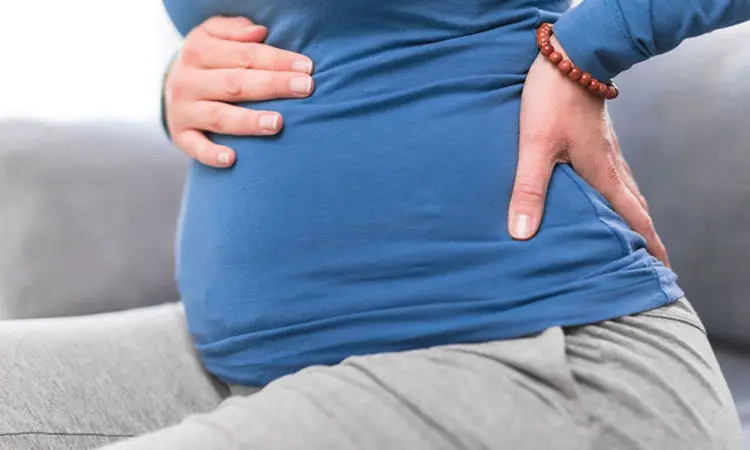
Many women experience hip pain during pregnancy. It is found that around 32 % of expecting women have experienced hip pain sometime during their pregnancy. Even though the pain more often appears during the second and third trimesters, some women experience it as early as the first trimester.
The hips are prone to pain because of its role in supporting the whole body and its movement. Any sort of body movement can put pressure on the hip. Also, any strain due to sitting or lying down in particular positions can take a toll on hips during pregnancy.
Causes
The main cause of hip pain during pregnancy is the surge of the pregnancy hormone relaxin. This hormone loosens the muscles and ligaments in the hip area. This can bring about hip pain. Another cause is weight gain which is an inevitable part of pregnancy.
Most of the pregnancy-related weight gain used to happen in the midsection. As a result, the center of gravity begins to shifts resulting in poor alignment of the midsection. This put extra pressure on the hips and cause hip pain.
Increased pressure induced by the growing uterus on the sciatic nerve, is another reason for hip pain during pregnancy. Sciatic nerves ate two nerves that run from the lower back to the feet. This issue is called sciatica. Sciatica can cause hip pain.
Symptoms
Expecting women experience hip pain in different ways. For some women, it is dull and constant. On the other hand, some expecting mothers experience sharp and infrequent hip pain. Hip pain can be mild or severe. Hip pain sometimes feels like back pain, especially if the pain is radiating.
Remedies
Applying a warm compress is an excellent means to relieve hip pain. Either a warm towel or heating pad works well. Using a supportive device like a Pelvic belt provides extra support to the hips and helps to relieve pain.
A pregnancy pillow is a good buy when it comes to aches and pain during pregnancy. Keep a pillow between the knees while sleeping. It will provide support to the hips.
Exercises like walking and swimming can help to deal with hip pain. Many yoga poses are highly beneficial to relieve hip pain. Do it under a teacher’s supervision. A teacher can guide you through some modified yoga postures for pregnancy.
Maintaining good posture helps to relieve hip pain. While sitting makes sure your back is straight and make sure your lower back is getting proper support. Never cross the legs while sitting. While standing, distribute your weight evenly to both legs rather than shifting weight to one leg. Never sit or stand in the same position for a long time.
Stay away from activities that make the hip pain worse like carrying weight, climbing stairs frequently, etc.
7. Neck pain
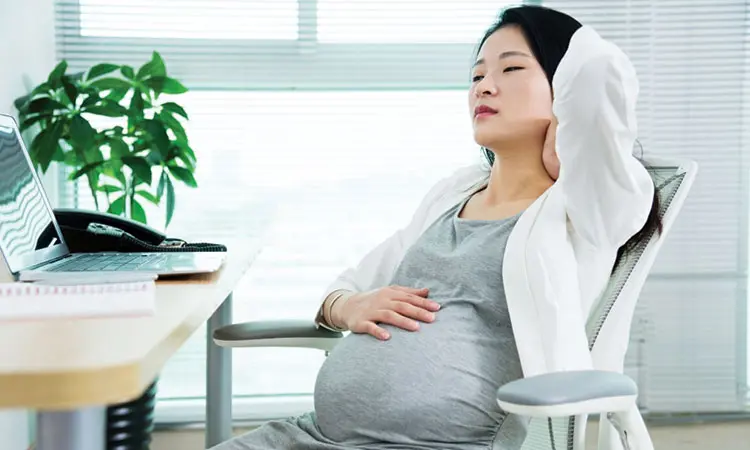
Neck pain is a common complaint during pregnancy, especially among working women. The neck muscles can easily get strained during pregnancy. Poor postures like leaning over the computer or worktable increase the chances of neck pain during pregnancy.
Causes
Surging of pregnancy hormones that relax the muscles and ligaments can also loosen the neck muscle. The ligaments in the neck also start to stretch with the muscle of the back and spine to support the growing abdomen. These factors contribute to neck pain.
The expecting mothers are recommended to sleep on their left side. Continuously sleeping on the left side implies constant pressure on the left side. This can contribute to stiffness in the neck and leads to pain. Using the wrong pillow also can contribute to neck pain.
Symptoms
Neck pain usually starts in the neck and radiates to the shoulder and muscles nearby. Neck pain can be accompanied by headache, numbness, or even swelling in the neck.
Remedies
Warm compress and cold compress are equally beneficial to relieve neck pain to an extent. Use a good pillow that supports the neck. Hydrotherapy is another remedy to relieve neck pain.
For this, take a warm shower. When you are in the shower, let the water from the shower directly hit the affected area of the neck. Let the water run for a few minutes. Now swap warm water with cold water and repeat the process. You will feel some relief from neck pain.
Neck massage is another remedy. A gentle massage after a hot bath is very effective in relieving neck pain. It will help to relax the sore neck muscles. Let someone in the house do it for you. Using lavender oil, olive oil or coconut oil will enhance the result.
Stretching exercises for the neck is also effective. Just slowly turn your head to both sides as far as you can stretch it. Hold it for at least 15 seconds on both sides. Now push the chin to your chest. Hold it for a few seconds. You will again feel your neck stretching. Now slowly throw the head backward.
8. Round ligament pain
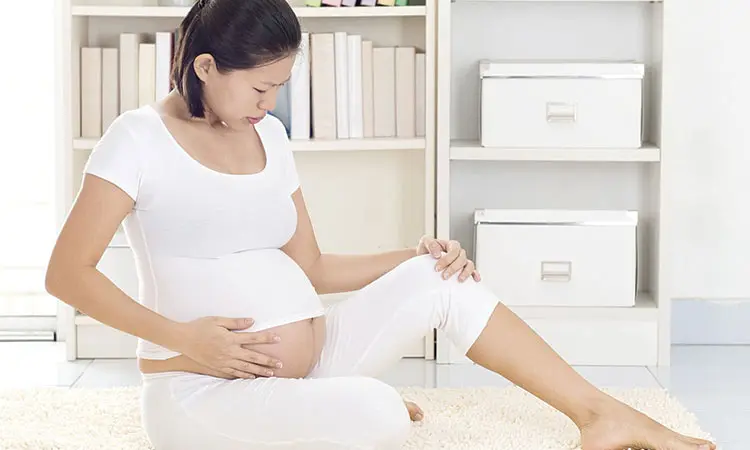
Round ligament pain is another common pain during pregnancy. It most often starts during the second trimester. Numerous thick ligaments encircle and hold the uterus as it grows during pregnancy. The round ligament is one of those ligaments.
The round ligament will stretch and thickens eventually in compliance with the growth of the uterus, thereby, holding the enlarging uterus in the correct position.
As the baby and womb grow, the round ligament starts to stretch. The round ligament usually tightens and relaxes little by little. However, sudden movements of the baby inside the uterus can result in the quick tightening of the ligament, similar to a rubber band snapping.
Causes
Any sudden movement, voluntary or involuntary, can trigger round ligament pain during pregnancy and even otherwise. Coughing or sneezing, laughing, turning over in the bed, standing up too fast, etc are the most common triggers.
Symptoms
Deep, sharp, stabbing pain in one or both side of uterus.
Remedies
Changing the position helps to alleviate the pain. If the pain begins while you are standing, try to sit down slowly. Similarly, if it begins when you are sitting, get up slowly and walk. When it comes to ligament pain, slower movements can be highly beneficial. Change positions slowly
Bending over, stretching, and lying down are other positions you can opt for while changing your position to stop the round ligament pain. If you opt to lie down, lie down on the opposite side of the pain.
Practicing Yoga and stretching exercises will help to bring down the chances of ligament pain. Good posture helps you to keep away from round ligament pain. Avoid locking your knees.
Sitting on an exercise ball is found highly beneficial to get rid of round ligament pain. Avoid sitting or standing for a long time continuously
A warm compress or warm bath can help to alleviate the ligament pain. Lying down and gently massaging the ligament area (focus on both sides of the uterus) also helps to soothe round ligament pain. Wearing a maternity belt also helps relieves round ligament pain to a great extent
9. Lower Back pain
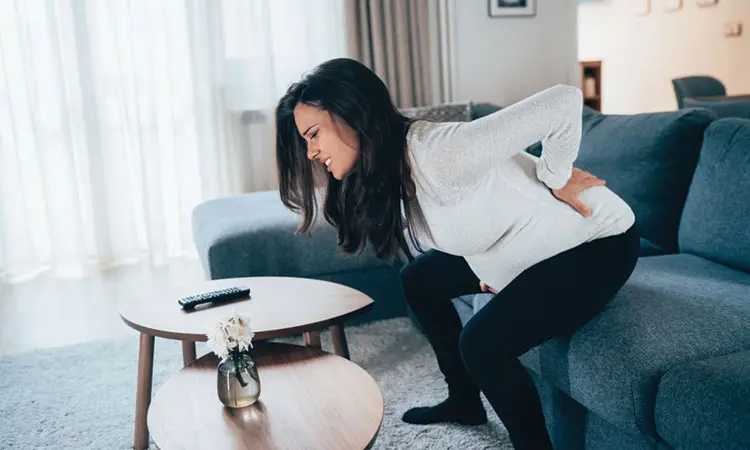
Lower back pain is a common complaint amongst women during pregnancy. It also affects many women post delivery too.
Causes
As the pregnancy hormones loosen the ligaments and muscles, all joints get affected. The strain in the joints of the lower back can cause back pain. Also during pregnancy, most of the weight you gained is in your middle part. This will also put a strain on the lower back triggering back pain.
Symptoms
Persisting dull or severe pain concentrated on the lower back is a sign of back pain during pregnancy.
Remedies
Apply warm compress in the affected area. Make sure your lower back is getting support wherever you sit. Use comfortable footwear with good arch support. Whenever you can, use a stool or chair to elevate your feet. Sleep on your side with a pillow between your legs.
Maintain good posture. A maternity support belt gives extra support to the lower back and helps to relieve pain. Keep a pillow between the knees while sleeping. Studies have shown that prenatal yoga is best to relieve back pain.
FAQs
Yes. It is quite normal. During pregnancy, your body is going through many changes. Body pain is just a small consequence of these changes. Surging pregnancy hormones paves the way for body aches during pregnancy
Maintaining good posture, avoiding the triggering factors, prenatal massage and prenatal exercise can help to relieve body aches during pregnancy. Also following a nutritious diet and staying well hydrated is important.
Yes. Aches and pains are common during early pregnancy as well. Headaches, pain in breasts, leg pain, joint pain, etc can appear from the first trimester onward.

